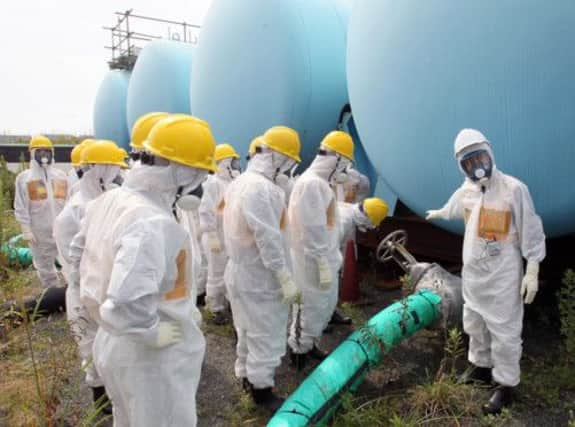Japan faces non-nuclear future as last plant shuts


Kansai Electric Power’s Ohi No.4 reactor was last night disconnected from the power grid and then shut for planned maintenance. It is the only one of Japan’s 50 reactors in operation after the nuclear industry came to a virtual halt following the March 2011 Fukushima disaster.
Japan last went without nuclear power in May-June 2012 – the first shutdown since 1970 – a year after a massive earthquake and tsunami triggered reactor meltdowns and radiation leaks at the Fukushima facility. The country’s nuclear reactors provided close to a third of the electricity to keep the economy going before the Fukushima disaster, and utilities have had to spend billions of pounds importing oil, gas and coal to make up for the shortfall.
Advertisement
Hide AdAdvertisement
Hide AdBut despite signs that the Fukushima crisis is worsening, Japan’s commitment to restarting many of its idle reactors appears stronger than ever, a year after a previous government said it would begin to phase out nuclear power completely.
Prime minister Shinzo Abe, who took office in December, says nuclear power remains essential, even with a surge in generation capacity from solar, wind and other renewable sources, and that Japan cannot afford the mounting costs from importing gas and oil.
Four nuclear plant operators have applied to restart a dozen reactors under revised safety guidelines, though the pace will be relatively slow, with the first expected to come online early next year at the earliest. Inspections take about six months for each reactor.
In 2011, Japan suffered its first trade deficit in more than three decades, and in July of this year it logged its third-biggest trade deficit on record, at 1.02 trillion yen (£6.6 billion). The ruling Liberal Democratic Party and the utilities are keen to get reactors up and running again, with Mr Abe singling out reducing fuel costs as a key plank of his economic reform plans. But opinion polls show a majority of Japanese want to end reliance on atomic power, and oppose re-starts.
“The argument that no nuclear power dents the economy would be myopic, considering that if by mistake we had another tragedy like Fukushima. Japan would suffer from further collateral damage and lose global trust,” said Tetsunari Iida, head of the Institute for Sustainable Energy Policies, and a renewable energy expert.
“In the new economy, the less you use energy, the more value-added you become. The big chorus for nuclear power is hampering the efforts to move to a new, more open economy.”
Since April 2012, Japan has increased its generation capacity from renewable sources by 15 per cent to about 3.4 million kilowatts.
“Over the last two years, there’s been a realisation among the big players – Toyota, Hitachi, shipbuilders – that there’s a huge opportunity in power,” said Andrew DeWit, a professor at Rikkyo University in Tokyo. “We’re also seeing radical efficiency gains.”
Advertisement
Hide AdAdvertisement
Hide AdEven if Japan’s nuclear plants are allowed to restart, many will soon reach their 40-year operating limits, raising the issue of whether and how they will be replaced. Meanwhile, the disposal and security of nuclear waste are issues yet to be resolved.
For now, however, it appears any phase-out of nuclear power will be very gradual.
“In the long term, if we can create new resources that are more efficient than the current oil-based system, then we can rely less on nuclear power, that’s quite possible,” said Masamichi Adachi, an economist at JP Morgan in Tokyo. “But it will take quite a long time.”